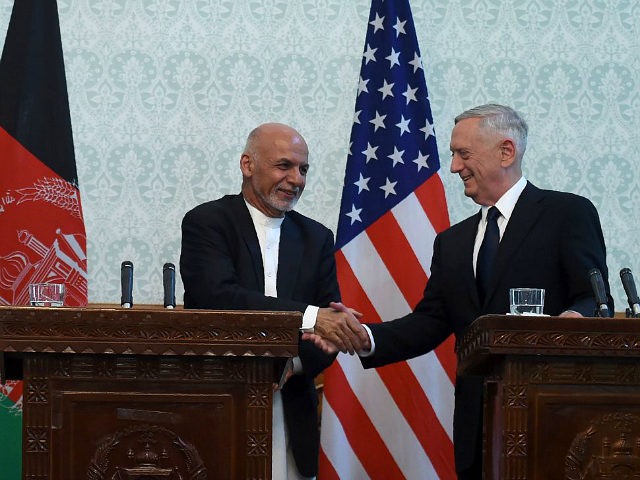Afghan President Ashraf Ghani, echoing the position of the United States, says the only “two options” available for the Taliban at this juncture in the 16-year-old war in Afghanistan are to continue pursuing their terror campaign and be annihilated or renounce violence and embrace peace.
Peace efforts failed under former U.S. President Barack Obama, resulting in the Taliban now being in control of more territory than at any other time since the American military dethroned their regime in late 2001.
“The Taliban now have two options: one, to be a tool for someone else’s policy and remain allied with international terrorists, which result in their annihilation; or end the war and violence and participate in bringing peace and prosperity to the country,” declared Ghani, later adding:
Peace will also pave the way for a strong defense against international terrorism, focus on development programs, elimination of poverty, and establishing prosperity for our people.
I call on our neighbors, near and far, from India to Russia, to participate in forging regional consensus since the threat posed by terrorism has not been eliminated but growing day by day.
The Afghan leader made those comments during a press conference Wednesday with U.S. Secretary of Defense James Mattis and NATO Secretary General Jens Stoltenberg that took place as terrorists fired “between 20 and 30 rockets” at the Kabul international airport, allegedly targeting the Pentagon chief, reports India Today.
Both the Taliban and the Islamic State (ISIS/ISIL) have reportedly claimed responsibility.
Despite their alleged rivalry, the two jihadist groups have been known to cooperate in Afghanistan.
Soon after U.S. President Donald Trump announced his Afghan war strategy last month, American Gen. John Nicholson, the top commander in the country, explained that the plan is “determined” to pressure the Taliban into engaging in peace negotiations with Kabul by making the jihadists realize they cannot win.
For years, the Taliban has refused to participate in peace negotiations, arguing that it is winning the war.
Consistent with the findings of a congressionally-appointed U.S. watchdog agency, the Long War Journal (LWJ), a component of the Foundation for the Defense of Democracies (FDD) think tank, reports that the Taliban controls of contests nearly half (45 percent) of Afghanistan.
Last week, U.S. President Donald Trump reportedly urged his Afghan counterpart to close the Taliban’s self-described “political office” in Qatar, arguing that it has failed to accomplish its intended purpose of serving as a channel for peace talks with the U.S. and Afghanistan.
President Ghani has expressed support for shutting down the Taliban office, pushing the Qatari foreign minister to do so in February.
Despite the previous U.S. administration’s efforts to convince the Taliban to participate in peace discussions, there has been no discernible progress in negotiations with the terrorist group.
Explicitly addressing the U.S.-backed reconciliation efforts by Kabul, the Afghan leader told reporters Wednesday that Afghanistan is ready for peace, noting that the ball is in neighboring Pakistan’s court.
The Pentagon and President Trump have accused Pakistan of harboring terrorist groups fighting and killing Americans in Afghanistan, namely the Taliban, al-Qaeda, and their ally the Haqqani Network, considered one of the top threats to peace in the war-ravaged country.
Afghan and Indian officials have made similar claims, which Pakistan has long denied.
“Our security forces are becoming stronger each day with increased capabilities to defend the Afghan people and land,” also said President Ghani on Wednesday, warning that the U.S.-backed local troops will decimate those pursuing terrorism and “history will judge those who do not want to join the peace.”
Although the United States has invested nearly $70 billion and years of military training to develop the Afghan National Defense and Security Forces (ANDSF), they continue to suffer from capability lapses, according to assessments from inside and outside the American government.
The Bureau of Investigative Journalism, an NGO, and the U.S. Special Inspector General for Afghanistan Reconstruction (SIGAR), a congressionally appointed watchdog agency, recently blamed the capability problems on the use of “ghost” or nonexistent soldiers.
Corrupt officials seeking to line their pockets have reportedly exploited the U.S.-funded salaries of the ANDSF by inflating rosters with ghost personnel to receive more money, a move that has corroded combat readiness among the Afghan security forces, which include military and police units.

COMMENTS
Please let us know if you're having issues with commenting.